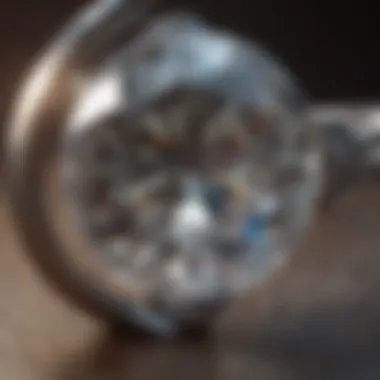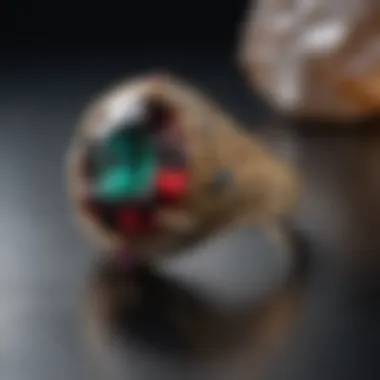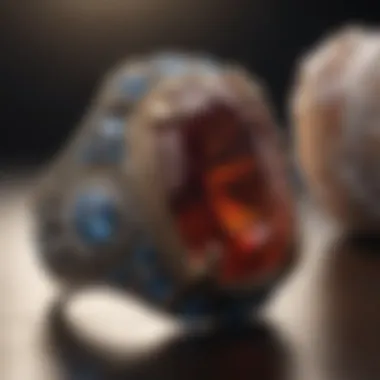Finding Local Ring Appraisal Services: A Guide


Intro
Navigating the intricate world of ring appraisal services can feel like finding a needle in a haystack. When you own valuable gemstones or jewelry, understanding their worth is not just a good idea; it’s essential. Whether you’re looking to insure a beloved family heirloom or contemplating a sale, a professional appraisal can shed light on the true value of your possessions.
This guide aims to illuminate the various avenues to acquire local ring appraisal services, while also emphasizing the importance of accurate gemstone valuation. By following this path, jewelry owners and gemstone enthusiasts alike will find themselves better equipped to identify reputable appraisers, ask the right questions, and ultimately make informed decisions regarding their cherished items.
In the coming sections, we will breakdown the essentials— from the types of appraisal services available to suggested questions for appraisers, ensuring that when you step into an appraisal, you feel not just prepared, but confident.
Understanding Ring Appraisals
Understanding the ins and outs of ring appraisals is crucial for anyone who owns jewelry, especially those intricately designed pieces that often carry emotional or financial weight. For many, a ring is not just a piece of jewelry; it can be an heirloom, a symbol of love, or a significant investment. Knowing the value can influence insurance arrangements, resale opportunities, and even personal wealth assessments. Without this knowledge, one might stroll through life blissfully unaware of what they possess or, conversely, overestimate their holdings.
The Purpose of an Appraisal
The primary function of an appraisal is to determine the monetary value of a ring at a specific time. But don’t be fooled into thinking it’s merely a number on a piece of paper. An appraisal serves several purposes:
- Insurance Protection: An appraisal is essential when insuring your ring. It gives your insurance company concrete evidence of the ring’s worth, which assists in securing appropriate coverage.
- Selling or Trading: If you consider selling or trading your ring, having an appraisal can streamline the process. Buyers or trade partners trust a verified appraisal more than a verbal claim about its worth.
- Personal Awareness: Knowing the value of your ring allows for better financial planning. It can also provide peace of mind realizing its worth in times of need.
So, whether you’re simply curious or need the appraisal for practical reasons, a thorough understanding of its purpose will guide your next steps.
Importance of Accurate Valuation
Now, let’s dive into why accurate valuation matters. Getting a precise appraisal goes beyond having a fancy document displayed at home. Several factors underscore its importance:
- Market Fluctuations: The jewelry market can be volatile. An appraisal today may be different from the same appraisal done two years down the line. An accurate and timely assessment reflects the current state of the market, ensuring that you’re not left in a lurch down the road.
- Emotional Value vs. Market Value: Often, there’s a disconnect between what a piece means to you emotionally and its market value. An accurate appraisal brings those two elements into focus, helping you manage expectations if you decide to sell or inherit something.
- Legal Matters: If there are any legal proceedings related to your jewelry—divorce, estate settlements, etc.—having a trustworthy appraisal can be invaluable. This could spell the difference between a fair division and a messy dispute.
Consequently, seeking an accurate appraisal from a qualified, trustworthy appraiser significantly bolsters your grasp of both your personal jewelry collection and its current market landscape. It's money well spent, giving you knowledge that pays dividends in several areas of life.
Types of Ring Appraisals
Ring appraisals come in various flavors, each tailored to specific needs and situations. Understanding these types is crucial for anyone looking to ascertain the value of a piece of jewelry—be it for insurance, resale, or personal knowledge. Each appraisal type serves a different purpose, and navigating through these will help you decide which one meets your requirements best.
Insurance Appraisals
Insurance appraisals are pivotal for those wishing to safeguard their valuable pieces against theft, loss, or damage. This type of appraisal establishes a value that is essential for determining the right level of coverage for insurance policies.
- Purpose: The main goal here is to ensure that if anything happens to your ring, you’ll be adequately compensated. It’s like having a safety net for your investment.
- Details: An insurance appraisal will often include a detailed description of the ring, including specifics about the gemstones, metals, and any unique characteristics.
- Documentation: The appraiser typically provides a formal report which can be submitted to your insurer. This document might also be required for claims.
- Frequency: It's wise to revisit your insurance appraisal periodically, especially if the market conditions fluctuate or if you make changes to the ring, like resizing or remounting.
Market Value Appraisals
Market value appraisals provide insight into how much a piece of jewelry could fetch on the open market. This type of appraisal is especially useful for sellers, collectors, or anyone curious about the worth of their assets in terms of current market trends.
- Understanding Trends: The appraiser considers not only the intrinsic value of the ring but also current market conditions, demand, and collector interests. The “hot” items at auctions today might not be the same as next year.
- Valuation Techniques: This approach may involve looking at recent sales of similar pieces to provide a comparative analysis. Using this method, you get a realistic picture of what your ring is likely worth if you were to sell it.
- Investment Decisions: Knowing the market value can empower owners to make informed choices about buying or selling, much like keeping tabs on stock prices.
Fair Market Value Appraisals
Similar to market value appraisals, but slightly different in scope, fair market value appraisals help establish a worth that reflects the price a willing buyer would pay to a willing seller in an open market scenario.
- Key Distinction: The term 'fair market value' denotes a price agreed upon by both parties, which means neither party is under pressure to buy or sell. It’s a more personal and less speculative valuation than market value.
- Purpose: This type often plays a significant role when it comes to estate planning, donations, or even divorce settlements. It ensures that the valuation process is equitable.
- Documentation: An appraisal report for fair market value typically contains thorough descriptions and photographs of the item to substantiate its condition and authenticity.
- Use Cases: This appraisal can also be relevant for tax purposes, particularly when describing the value of donated goods.
"Understanding the nuances of ring appraisals can save you time, money, and heartache, especially when it comes to protecting your valuable pieces."
Where to Find Appraisal Services Near You
Finding reliable appraisal services for your ring is essential. This isn't just about getting a pretty certificate; it can have significant implications for insurance and resale value. Knowing where to seek out these services can save you time and provide peace of mind.
When searching for local appraisal options, it's important to consider various avenues. The right choice could make all the difference in the perceived value of your piece. Here’s a closer look at some practical sources where you can find appraisal experts near you.
Local Jewelers and Retailers


Local jewelers often have a wealth of information when it comes to appraisals. Many have certified gemologists on staff or work closely with appraisal experts. It's not uncommon for these jewelers to offer appraisal services themselves, and they may even be familiar with the specific characteristics of the local market.
Benefits of Choosing Local Jewelers:
- Personalized Service: You can discuss your needs face-to-face, allowing for a tailored approach to the appraisal process.
- Local Market Insight: They understand the local demand and can provide insights into current valuation trends.
- Potential Discounts: If you purchased the ring from them, they might offer reduced rates on appraisals.
Take the time to call or visit a few jewelers in your area to find out who they recommend for appraisals. Word-of-mouth can be quite powerful here.
Independent Appraisers
Unlike retail jewelers, independent appraisers offer unbiased evaluations. They generally work based on their qualifications and expertise, rather than company guidelines. Independent appraisers are typically certified and accustomed to delivering comprehensive and detailed reports.
Considerations When Seeking Independent Appraisers:
- Credentials: Always ask about their professional qualifications and any relevant certifications.
- Affiliations: Check if they belong to reputable organizations, as this often times ensures credibility.
- Location: Sometimes, appraisers will hold their offices in less conventional places, so being open-minded is key.
If the idea of a non-chain appraiser appeals to you, do a quick search online or in local directories to unearth hidden gems in your area.
Professional Organizations
Reputable appraisal professionals belong to various recognized organizations, which can provide a starting point for your search. Organizations like the Gemological Institute of America (GIA), the American Society of Appraisers (ASA), and the International Society of Appraisers (ISA) maintain directories of qualified appraisers.
Advantages of Using Professional Organizations:
- Credibility: Members adhere to professional standards that promote integrity.
- Resource Access: Many organizations offer publications, guidelines, and advice on appraisal.
- Network Support: Professional organizations can often provide referrals to trusted colleagues.
Investigate these organizations and check their online listings to pinpoint qualified appraisers in your vicinity.
Online Appraisal Services
In today's world, convenience often reigns supreme, leading many individuals to seek online appraisal services. Several platforms offer evaluations without the need for face-to-face interaction. These services can be convenient, especially if you live far from major urban centers.
Key Factors to Weigh for Online Services:
- Security and Privacy: Make sure they take your information seriously and employ encryption.
- Reputation: Read reviews and possibly check forums like Reddit for experiences shared by others.
- Pricing Transparency: Look out for any hidden fees.
While online appraisals can be handy, make sure you’re receiving valid and trustworthy evaluations. It can be all too easy to miss the human touch that comes with local interactions.
In the end, finding appraisal services near you is more about understanding your needs and preferences than simply getting the job done. The right choice could impact the value of your treasured piece for years to come.
Questions to Ask an Appraiser
Understanding what to inquire about when seeking the services of a ring appraiser is essential. Asking the right questions can not only clarify the appraisal process but also ensure that you engage a qualified professional. The appraiser's expertise and transparency in their approach can make all the difference in obtaining an accurate valuation. Let's delve into the critical questions you should pose before committing to an appraisal.
Qualifications and Experience
When evaluating an appraiser, you should prioritize their qualifications and experience. Ensuring that the appraiser has relevant credentials can save a lot of heartache further down the line. Ask about their educational background, training, and years spent in the industry.
It's vital to check if they hold certifications from reputable organizations, like the American Society of Appraisers or the Gemological Institute of America. These credentials often signify a commitment to professional standards and ongoing education in gemstones. Experience matters; a seasoned appraiser will have an in-depth understanding of market trends and can provide a more nuanced valuation. If they’ve worked with jewelry similar to yours, it’s a plus.
Methodology Used in Appraisal
Another crucial area to investigate is the methodology used in appraisal. This refers to the techniques and processes the appraiser employs to arrive at a valuation figure. You may want to ask whether they use comparative analysis, replacement cost analysis, or income approach. Each method has its merits, so understanding their approach helps you gauge how they might value your ring.
Furthermore, inquire about specific factors they consider during their assessment. A good appraiser should take into account aspects like the quality of the gems, the setting, and current market conditions. Providing you with a clear outline of their process reflects professionalism and thoroughness.
Type of Certification Provided
You should also ask about the type of certification provided at the end of the appraisal process. Different appraisal services offer different levels of documentation. For instance, a comprehensive appraiser might provide a detailed report that includes photographs, descriptions of the piece, and a written opinion of value.


Make sure to inquire how that documentation can be effective for insurance claims or resale situations. A rigorous appraisal report adds credibility to your jewelry's value and may be necessary for insurance purposes. Not all appraisals are created equal; thus, clariying the details will help ensure your investment is protected.
"Having a well-documented appraisal is a safeguard for your investment. Always clarify the type of certification you’ll receive."
Evaluating the Appraisal Process
The process of evaluating a ring appraisal cannot be understated. It's pivotal, especially for those who own valuable pieces and seek to understand their significance. An appraisal goes beyond mere numbers; it encapsulates the essence of the ring—its history, craftsmanship, and emotional value. Being thorough during this phase assures that you grasp the complete picture of your asset's worth.
Initial Evaluation of the Ring
The initial evaluation is a critical step that sets the tone for the entire appraisal process. This stage typically involves a jeweler or an independent appraiser examining the ring closely. They assess not just the visual attributes, but also conduct technical evaluations, including:
- Material Composition: Determining the type of metal used in the band and any prongs. Different metals like platinum, gold, or silver bring varying values.
- Gemstone Characteristics: The appraiser inspects the main gemstone—its carat weight, cut, color, and clarity. For instance, diamonds are graded on specific scales which directly influence their worth.
A skilled appraiser will take note of any distinguishing features or imperfections that could affect value. It's during this examination that they'll also ask questions about the ring's purchase history and any previous appraisals. All this information contributes to establishing a foundational understanding of the ring’s value.
Factors Affecting Value
Several elements come into play when determining the final market value of your ring. Understanding these factors helps to offer clarity on what influences the appraisal and why your piece might not be worth as much as you expect. Prominent factors include:
- Market Demand: Just like other commodities, the demand for specific styles or types of gemstones fluctuates.
- Provenance: Rings that have historically significant backgrounds or connections can command higher prices. If the ring belonged to a famous person, its value could skyrocket based on its story rather than just materials.
- Condition: The state of the ring matters immensely. A well-maintained piece will fetch a better value compared to one that has incurred damage or wear over time.
In some cases, the appraisal might reveal surprising insights. For instance, a ring that appears simple might have an outstanding appraisal if it carries a hidden gem or intricate craftsmanship, emphasizing the need for expert evaluation.
Finalizing the Report
Once the appraiser compiles their findings, they will draft a formal appraisal report, which is crucial for various reasons. This report typically includes:
- Detailed Descriptions of the Ring: Including all vital specs and identifying characteristics.
- Value Assessment: A thorough breakdown of how the estimated value was determined, along with a market comparison.
- Certification: An official document confirming the appraiser's qualifications and any relevant accreditations.
The finalized report serves multiple purposes. It can provide you with a legal record for insurance purposes, or it can assist in future selling scenarios. Having all of this information laid out helps create a trustworthy narrative—a crucial component in any negotiation.
"Understanding the ring appraisal not only influences insurance logistics but also serves as a means of communicating its worth in the broader jewelry market."
By recognizing the intricacies involved in the appraisal process, you empower yourself as a consumer. This understanding allows you to make informed decisions about your jewelry and protects your investments. Knowledge is truly a gem in itself.
Pricing Your Ring Appraisal
When you set out to have your ring appraised, getting a clear understanding of the pricing involved is essential. Pricing influences not just your immediate decisions, but also how you view the overall value of your jewelry. Knowing what to expect in terms of cost can help you avoid surprises and ensure you're getting fair treatment in this pursuit.
Understanding Appraisal Fees
Appraisal fees can vary widely based on multiple factors. This includes the complexity of the item, the appraiser's experience, and even the regional market. Generally, fees may be charged hourly or as a flat rate, and knowing these distinctions can save you from shelling out more than necessary.
- Flat Fee: Some appraisers charge a single fee for a standard appraisal. This can be an advantageous option as it offers predictability in costs.
- Hourly Rate: Others might bill by the hour, so if your ring has intricate detail requiring extended examination, it could lead to a higher bill.
- Percentage of Value: Some fees are calculated as a percentage of the ring's estimated value, typically ranging from one to three percent.
When discussing appraisal fees, it’s prudent to ask about any ancillary costs. For instance, if the appraiser requires additional lab testing for a gemstone, that might not be included in the initial quote. Always ensure that the full scope of charges is clear before proceeding.
Comparing Costs Across Services
Once you have a grasp of the potential fees, comparing costs among different appraisers is the next logical step. Here's why this matters:
- Local Variances: Prices can differ significantly by geographic area. Understanding local market rates can guide you to make informed choices.
- Service Levels: Not all appraisal services are created equal. Some might offer comprehensive evaluations including photographic documentation, while others might only provide basic written appraisals.
- Reputation and Trust: Sometimes, the least expensive option isn’t necessarily the best. Consider the reputation of the appraiser. Appraising as you glean insights about their background is crucial. Look for reviews or testimonials that speak volumes about their reliability.
- Industry Standards: Familiarizing yourself with the industry standards can give you leverage. If one appraiser’s fee significantly deviates from average rates, questioning it could lead to valuable insights about their methodology.
To aid in making comparisons, you could compile a short list of appraisers you are considering, then note down their costs while reflecting on the services they offer.
Ultimately, understanding and comparing appraisal fees not only puts you in the driver's seat, it also ensures you receive an evaluation that truly reflects the worth of your cherished piece. Make every dollar count!
Challenges in the Appraisal Industry


Navigating the appraisal landscape can feel like trying to untangle a ball of yarn. There are various challenges that both appraisers and clients face, making it crucial to understand these nuances. Grasping these challenges not only helps clients get a fair deal, but also informs appraisers about maintaining their integrity and standards. The appraisal field is particularly susceptible to issues like over-inflated values and finding trustworthy professionals. Tackling these topics can significantly enhance the appraisal experience for everyone involved.
Avoiding Over-Inflated Values
One of the most persistent challenges in the appraisal industry is the tendency for some appraisers to inflate values. Over-inflated appraisals can arise from various motives—some appraisers might hope to appeal to the emotional connection of their clients, wanting to make them feel good about their investment. Others could be looking to enhance their commission-based income or meet certain market demands.
It's important for jewelry owners to approach appraisal with a discerning eye. Understanding the common reasons behind these inflated values can help in filtering out dubious appraisers. When discussing your ring or piece of jewelry, keep the following in mind:
- Market Trends: Awareness of current market trends can give you a benchmark. Knowing what an appraisal should realistically reflect based on market data helps to put inflated claims into perspective.
- Second Opinions: Don’t hesitate to seek a second opinion. If an appraisal seems suspicious, consulting another appraiser can help clarify whether your initial assessment was reasonable.
- Certifications and Associations: Appraisers who are members of reputable professional organizations are less likely to engage in unethical practices. Organizations like the American Society of Appraisers (ASA) and the International Society of Appraisers (ISA) uphold stringent guidelines that their members must adhere to.
"When it comes to appraisals, you want a clear picture, not an exaggerated postcard."
Choosing a Trustworthy Appraiser
Finding a trustworthy appraiser is like searching for a needle in a haystack. Firstly, consider that trust is built on reputation and credentials. When you’re looking for someone to assess your items, research diligently and vet potential appraisers through various factors:
- Qualifications: A sound background in gemology or a related field is vital. Look for professional designations, such as graduate gemologist (GG), which indicates a solid education in the subject.
- Experience: Experience can be a crucial indicator of quality. An appraiser who has been in the field for several years has likely dealt with various types of jewelry and gemstones, adding to their credibility.
- Client Reviews: Pay attention to client reviews and testimonials. While every service has its share of critics, a consistent pattern of positive assessments can often indicate a reliable professional.
- Methodology Transparency: A reputable appraiser should be forthcoming about their methodology. This transparency allows you to understand how they arrived at their valuation and ensures that it aligns with your expectations.
Taking the time to find a trustworthy appraiser can save you from future headaches and ensure that you receive a fair evaluation, except when no other choice could be available.
Post-Appraisal Considerations
After receiving a ring appraisal, several important factors come into play that can influence how you proceed with your valuable piece of jewelry. Understanding what to do next is not only crucial for the accurate representation of the ring's value but also for ensuring its protection and utility in future endeavors. This section emphasizes the significance of being well-informed about post-appraisal considerations, helping you navigate subsequent steps with confidence.
Using the Appraisal in Insurance
One of the primary uses of a detailed appraisal report is to insure your prized possession adequately. Jewelry, especially rings, can be substantial investments, sometimes worth thousands of dollars. This makes it vital to safeguard them against theft, loss, or damage. Here’s why the appraisal is essential in such matters:
- Establishing Value: Insurance companies require a certified appraisal to determine the correct coverage amount. This ensures that if the worst happens, you receive compensation reflective of your ring’s true value.
- Policy Inclusions: Depending on the insurer, your policy might require that the appraisal be updated every few years, particularly if your ring's value appreciates or if jewelry styles change.
- Documentation: A well-prepared appraisal document serves as proof of ownership and condition, enhancing your claim process should you need to file one in the future.
When presenting your ring for coverage, ensure clarity with your insurance agent about what the appraisal entails. Some might only cover the metal value; however, you need coverage for the entire piece, including gemstones or any intricate designs.
"A good appraisal is like a shield for your treasure, ensuring it remains safeguarded against the unintended storms of life."
Next Steps After Receiving Your Appraisal
Once the appraisal is in your hands, it’s not the end of the road. Instead, it marks the beginning of several critical steps you should consider:
- Museum-Quality Displays or Secure Storage: Depending on its value and your attachment to the piece, you might want to display it prominently or lock it away. Proper storage is paramount; consider using a safe or a bank safety deposit box.
- Periodic Updates: As mentioned earlier, revisiting appraisals every few years is wise. Markets fluctuate, and as trends come and go, the value of your ring might shift, too.
- Consult Professionals if Needed: Sometimes, you might want a second opinion or an updated appraisal for a specific purpose. Don’t hesitate to reach out to professionals to ensure your evaluation is current and valid.
- Involve Family Heirloom Planning: If the ring is a family heirloom, ensure that its appraisal and any documentation accompany it when passed down to next generations. This maintains not just financial value but also the emotional connection for family members.
- Leverage for Selling or Trading: Understanding your ring’s value can provide you with leverage in negotiations, whether you're selling or trading for another piece. Knowledge is power in these scenarios.
It's also good to remember that post-appraisal care is equally important. The way you treat your ring after getting it appraised might affect its longevity and value. Clean it properly, keep it away from harsh chemicals, and maintain its sparkle for years to come. With careful thought and action, you can ensure that your precious ring retains its value and significance within your jewelry collection.
Resources for Further Research
Understanding the appraisal process and related topics significantly enriches a jewelry owner's experience. Resources for further research provide insights into best practices, current trends, and fundamental principles honing in on ring appraisal services. Whether you're a gemstone enthusiast, a collector, or a jewelry designer, familiarizing yourself with diverse materials can only serve to enhance your valuation skills.
Books and Publications on Appraisal
Books and publications are pillars of knowledge that offer in-depth detail on various aspects of ring appraisal. They cover everything from the historical significance of gemstones to detailed methodologies on how appraisals are conducted. They often contain case studies that illustrate real-world applications of the theories discussed.
- Recommended titles include:
- "The Gemstone Handbook" by Robert M. Shipley: Offers insights on identifying and valuing gemstones, making it a staple for anyone interested in appraisal.
- "Appraising Personal Property" by James G. Dorsey: This book dives into appraisal principles, focussing on personal property which often includes jewelry.
- "The Jewelry Repair Manual" by William A. Seeley: Perfect for understanding both jewelry making alongside valuation aspects.
These resources can provide a solid foundation, enabling readers to demystify components like grading or market trends. They help build critical thinking in evaluating an appraiser's credentials, which is paramount when choosing someone to assess your prized possessions.
Online Forums and Communities
Online platforms serve as melting pots for ideas and shared experiences, wherein users can exchange valuable tips, ask questions, and seek recommendations on where to find reliable appraisal services. Platforms such as Reddit and Facebook host specific groups dedicated to jewelry and gem valuation.
- Benefits of Joining Online Communities:
- Access to varied experiences from fellow gemstone enthusiasts who have been in similar shoes.
- An opportunity to ask for feedback on certain appraisers or services directly from real users.
- Learning about emerging trends in jewelry appraisal and how it relates to market dynamics.
"Finding the right appraiser isn't just about the numbers; it's about understanding the art and science behind each value given. Engage with others who share your passion to untangle the intricacies of the appraisal world."
By leveraging these online forums and their collective wisdom, readers can make informed choices when navigating their appraisal needs. This continuing education empowers jewelry owners to approach their appraisal inquiries with confidence, fostering a deeper appreciation of their valued items.







